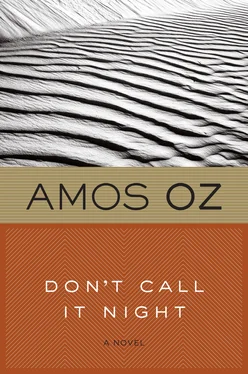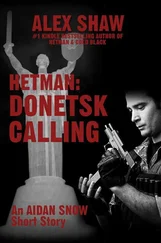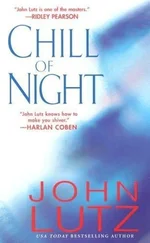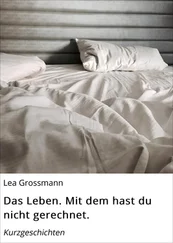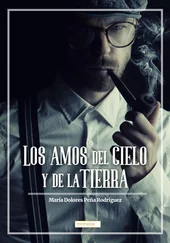On fine Saturdays I sometimes wake her at half past six in the morning, we get dressed and have coffee, then put on walkers and set off to find out what's new in the desert, walking down one wadi for a couple of hours and coming back up by another one. Once home we munch something from the refrigerator without bothering to sit down, then go back to sleep till the afternoon, when she likes to sit at the kitchen table, remote, bent forward, concentrating, planning a lesson or marking, while I sit and watch the red pen trembling between her fingers that have áged prematurely as though betraying her youthful body. One day I'll surprise her and buy her a little desk that can stand in the corner of her bedroom. Meanwhile I put it off so as to be able to watch her sitting at the kitchen table. While she finishes her marking I get some food together for us and switch on the TV, and we sit and watch the Saturday afternoon French film. On Saturday evenings we sometimes go out to a café or to the Paris. We stroll in the evening air for another half an hour in the square. Then we go home and listen to some quiet music sitting at the kitchen table. The next day another week begins here. Seven years have gone by like this, carefully avoiding the troupe of strolling players repeating, as if they were accursed, their old passion play: wandering, suffering, perdition. Until a weird pupil of hers died, in an accident when he was drugged, or it may have been suicide, there's no way of telling, and instead of editing a memorial volume, she agreed to help set up a rehabilitation clinic in his memory. The father of the boy has promised a financial donation, and for some reason I can't fathom decided to pick on her to run a sort of board of trustees. What does Noa know of committees and trusteeship, it's bound to lead to disappointment and embarrassment that I'd have liked to spare her, only I've no idea how. At first I tried to warn her off gently, and she responded with a sarcastic anger that 1 didn't know she had in her. Then I tried to help with various simple suggestions and was met with her cutting resentment. She did agree in an absentminded way to accept a loan from me, without seeing that as a shackle or a trap.
The only way I can help her is by avoiding any attempt to help. I have to hold back, as if to diminish a pain by regulating my breathing — and that I have no difficulty doing. Her strange project is becoming precious to her, "the gleam in your eye", as Shlomo Benizri says.
As though she had got herself a lover.
What about me? I followed her here, to her world's end, because I wanted only to be with her. Instead of the peace of the desert, all I have now is a sense of approaching danger. Which I can't prevent because I have no idea which direction it's coming from. Once, before all this, in the army, I volunteered to serve for six months in a small reconnaissance task-force in the desert, dashing around the Ramon Mountains in a couple of Jeeps, because I had turned down the command of an engineering platoon. It was before the road was built, before there were even dirt tracks here. Sometimes we would spot the silhouette of a hyena in the moonlight or a group of ibexes seemingly frozen on the line of the hills in the first light of dawn. Mostly we slept all day in hollows in the rocks and came out in the evening to give chase or to lie in ambush at night for caravans of smugglers crossing the Negev Mountain on their way from Sinai to Jordan. It was in 1951, or maybe 1952. We had a Bedouin tracker with us, a gruff, taciturn man, no longer young, dressed in the tattered uniform of the British Border Police, who knew how to read footprints even on rocky ground. He could sniff sun-dried donkey or camel dung and tell us who had passed this way, when, whether heavily laden or not, and even from which tribe. He could say on the basis of the dried-up dung what the beasts had eaten and where, and that is how he could work out where they were coming from and where they might be going and whether they were smuggling. He was a small, wiry man, and his face was not tanned but the colour of the cold ashes of a nomad campfire. It was said that his wife and daughter had been murdered in some tribal vendetta. And that he hopelessly loved a young cripple in Ashkelon. Even on nights when clouds blotted out the stars and the mountaintops he would bend down and pick up a rusty cartridge case, a faded buckle, a dry crust, traces of human excrement on the black scree, a gnawed bone thrown in a crevice, and decipher it with the tips of his fingers. We never let him have a gun, perhaps because he was always awake when we were asleep. It was only when we were all wide-awake and starting up the Jeeps full of the thrill of the chase, making the wadis re-echo in long rolls of dull thunder to our salvos of machine-gun fire, that he would detach himself from us and doze sitting down on the floor at the back of a filthy Jeep, with his foxlike chin between his knees, and his eyes neither open nor closed, waiting for silence to return and cover everything with a veil of greyish dust. Then he would wake without a sound and set off barefoot, stooped and crouching, as though straining to lick the soil, pattering away from us on his own to sniff out a cave or pit whose opening we had not even noticed as we drove past. Aatef was his name, but behind his back we called him "Night" because the night was as bright to him as if he had the characteristics of a nocturnal creature.
But we were careful never to use this name in his presence because, we reminded ourselves, in Arabic the Hebrew word for night, laila, is a woman's name.
I SNATCHED Muki Peleg from a raucous taxi drivers' reunion at the California Café, at the table they call the Council of Torah Sages: he had forgotten that we'd arranged to have a committee meeting this evening at Linda's. Look, men, feast your eyes, just see who's come to pick me up, he said to his friends, with the broad smile of someone having his picture taken with the President.
Walking westwards into the sunset, we crossed the square by the traffic lights. At the Paris Cinema they had a thriller on: so the British comedy had not been a success here. A lefty comedy, Muki said, Linda dragged me off to see it but I talked her into walking out in the intermission. We went back to my place instead to listen to some groovy music, the sort that turns you on, if you know what I mean.
I said I knew what he meant.
Then he told me he had invested thirty-three thousand dollars in a third share of a travel agency that specialized in sending groups of "floating" youngsters on trips to Latin America. Maybe Theo would like to join in, he knows a bit about sombreros, I caught them with their pants down literally seconds before the liquidator arrived, realistically my third is worth at least forty or fifty grand, and if Theo puts another thirty in we'll clear a cool hundred grand inside a year.
It was evening calm in the square. A westerly breeze was blowing, as though it was trying to bring the sea here. An occasional car drove past the line of parked cars. A flock of swallows was swirling to and fro above the streetlights, veering abruptly eastwards then changing its mind and settling in a huddle on the power lines again. I like this square that does not pretend to be what it will never be. The shops, offices and eating places, the simple window displays, everything is made with modesty. The Monument to the Fallen and the drinking fountain in front of it seem to suit each other and both seem to suit the centre of Tel Kedar. And the square seems right for itself, the way weekday clothes are right for a weekday. When Theo suggested seven years ago that they should put up a black basalt fountain surrounded with palm trees and black rocks I thought it was a cold idea. But there was no point in saying so, and anyway the suggestion wasn't accepted and there was never any chance it would be. It's not that he's short of ideas, they say here, the trouble is he's up in the clouds, old Sombrero, he's several sizes too big for our little town. It's some time since they've even said that because Theo has long since stopped making suggestions.
Читать дальше
